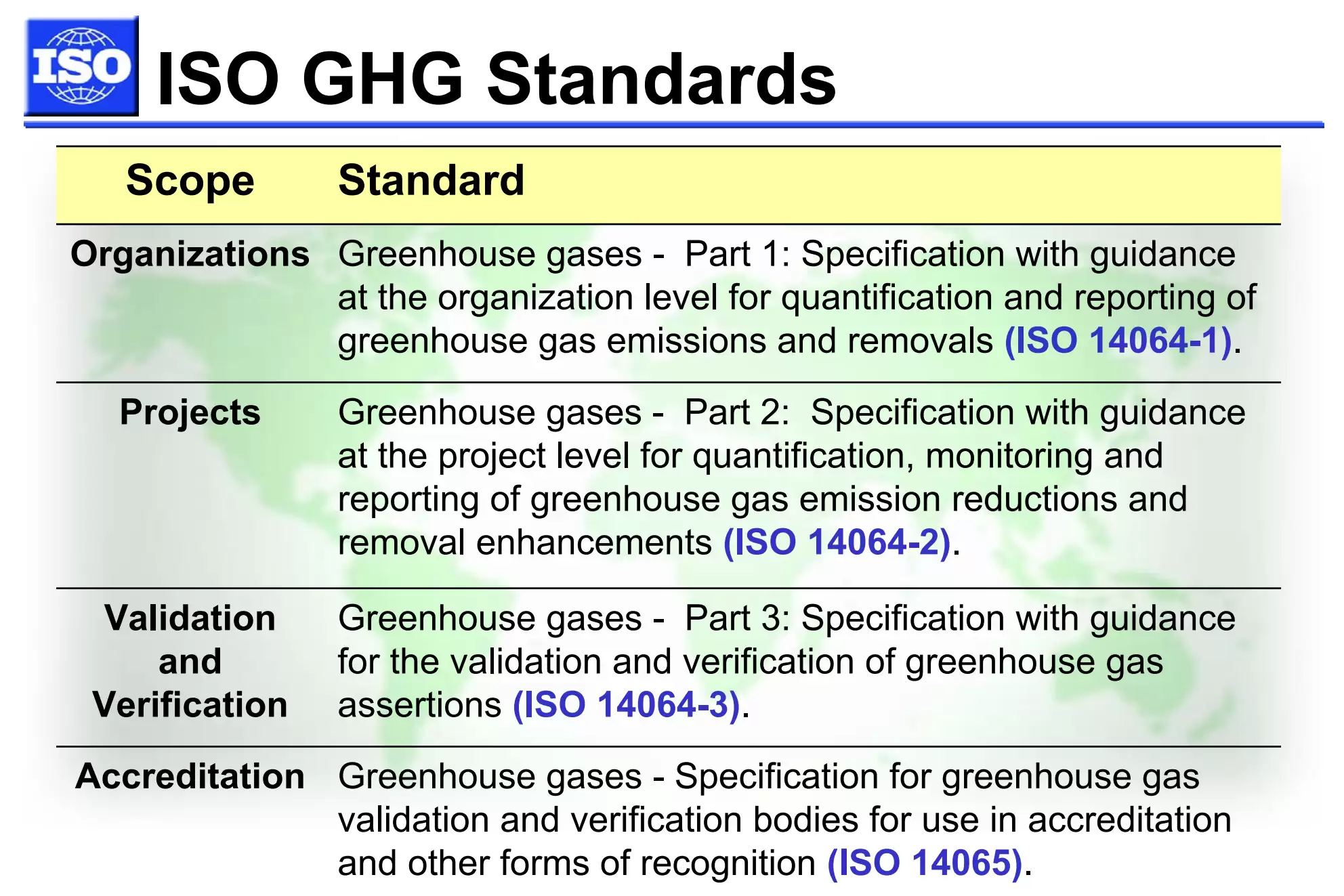What is ISO 14064?
In the contemporary world, the emphasis on environmental sustainability is greater than ever before. Organizations are increasingly seeking ways to reduce their environmental impact and demonstrate their commitment to sustainability. One critical tool aiding this endeavor is the ISO 14064 standard. This article delves into the ISO 14064 standard, explaining its significance, structure, and benefits for organizations of all sizes and sectors.
ISO 14064 is a set of international standards designed to assist organizations in quantifying and reporting their greenhouse gas (GHG) emissions. Published by the International Organization for Standardization (ISO), these standards provide a clear framework for measuring, managing, and reducing GHG emissions. The ISO 14064 standard is divided into three parts, each addressing different aspects of GHG accounting and verification.
The Structure of ISO 14064
- ISO 14064-1: Specification with Guidance at the Organization Level for Quantification and Reporting of Greenhouse Gas Emissions and RemovalsThis part focuses on the organizational level, providing a framework for quantifying and reporting GHG emissions and removals. It covers:
- Identifying GHG emission sources.
- Calculating GHG emissions and removals.
- Reporting the results transparently and consistently.
- ISO 14064-2: Specification with Guidance at the Project Level for Quantification, Monitoring, and Reporting of Greenhouse Gas Emission Reductions or Removal EnhancementsThis section addresses GHG projects, detailing how to quantify, monitor, and report GHG emission reductions or enhancements. Key elements include:
- Establishing a baseline scenario.
- Monitoring GHG reductions or removals.
- Reporting on the project’s performance and outcomes.
- ISO 14064-3: Specification with Guidance for the Validation and Verification of Greenhouse Gas AssertionsThe third part provides guidelines for validating and verifying GHG assertions. It outlines the requirements for:
- Conducting validation and verification processes.
- Ensuring the accuracy and reliability of GHG information.
- Reporting the validation and verification results.

Importance of ISO 14064
The ISO 14064 standard is vital for several reasons:
- Enhanced Credibility and TransparencyBy adhering to ISO 14064, organizations can enhance the credibility and transparency of their GHG reports. This is particularly important for stakeholders, including investors, customers, and regulatory bodies, who demand reliable and verifiable GHG data.
- Facilitation of Carbon TradingISO 14064 plays a crucial role in carbon trading markets. It provides the necessary framework for quantifying and verifying GHG emissions, which is essential for trading carbon credits. Organizations can confidently participate in carbon markets, knowing their GHG data meets international standards.
- Regulatory ComplianceMany countries have implemented regulations requiring organizations to report their GHG emissions. ISO 14064 helps organizations comply with these regulations by providing a standardized method for measuring and reporting emissions.
- Improved Environmental PerformanceBy following ISO 14064, organizations can identify areas where they can reduce their GHG emissions, leading to improved environmental performance. This not only benefits the environment but can also result in cost savings through increased energy efficiency and reduced waste.
Implementing ISO 14064
Implementing ISO 14064 involves several steps, which can be summarized as follows:
- Establish a GHG InventoryOrganizations need to establish a GHG inventory by identifying all relevant emission sources and quantifying their emissions. This involves collecting data on energy use, waste generation, and other activities that produce GHGs.
- Set Objectives and TargetsOnce the GHG inventory is established, organizations should set objectives and targets for reducing their emissions. This might involve setting specific reduction targets or implementing projects to enhance GHG removals.
- Develop a GHG Management PlanA GHG management plan outlines the strategies and actions the organization will take to achieve its GHG reduction targets. This might include energy efficiency measures, renewable energy projects, or other initiatives aimed at reducing emissions.
- Monitor and Report EmissionsOrganizations need to monitor their emissions regularly and report their progress towards achieving their GHG reduction targets. ISO 14064 provides guidance on how to report emissions in a transparent and consistent manner.
- Validate and Verify GHG DataValidation and verification are critical components of the ISO 14064 standard. Organizations should have their GHG data validated and verified by an independent third party to ensure its accuracy and reliability.
Benefits of ISO 14064 Certification
Obtaining ISO 14064 certification offers numerous benefits, including:
- Enhanced ReputationISO 14064 certification demonstrates an organization’s commitment to sustainability, enhancing its reputation among stakeholders. This can lead to increased customer loyalty and improved relationships with investors and regulatory bodies.
- Market OpportunitiesMany businesses and government agencies prefer to work with suppliers and partners who have robust environmental management systems in place. ISO 14064 certification can open up new market opportunities and provide a competitive edge.
- Cost SavingsBy identifying and implementing GHG reduction measures, organizations can achieve significant cost savings. This might include reduced energy costs, lower waste disposal fees, and other operational efficiencies.
- Risk ManagementISO 14064 helps organizations manage risks associated with GHG emissions, such as regulatory compliance and reputational damage. By proactively managing their emissions, organizations can avoid potential fines and other penalties.
- Employee EngagementImplementing ISO 14064 can also enhance employee engagement. When employees see their organization taking concrete steps towards sustainability, it can boost morale and foster a sense of pride and commitment.
Challenges and Considerations
While the benefits of ISO 14064 are substantial, organizations may face several challenges during implementation:
- Resource AllocationEstablishing a GHG inventory and implementing reduction measures can require significant resources, including time, money, and personnel. Smaller organizations, in particular, may find it challenging to allocate these resources.
- Data AccuracyAccurate GHG measurement requires robust data collection and management systems. Organizations must ensure that they have the necessary tools and expertise to collect and analyze GHG data accurately.
- Continuous ImprovementSustainability is an ongoing process. Organizations need to commit to continuous improvement, regularly reviewing and updating their GHG management plans to ensure they remain effective.
- Stakeholder EngagementSuccessfully implementing ISO 14064 often requires buy-in from various stakeholders, including employees, customers, and suppliers. Organizations must engage these stakeholders and communicate the benefits of the standard effectively.
Conclusion
The ISO 14064 standard is a powerful tool for organizations seeking to manage and reduce their greenhouse gas emissions. By providing a clear and consistent framework for quantifying, reporting, and verifying emissions, ISO 14064 helps organizations enhance their environmental performance, comply with regulations, and participate in carbon trading markets. Implementing ISO 14064 can lead to numerous benefits, including enhanced reputation, market opportunities, cost savings, and improved risk management. For organizations committed to sustainability, ISO 14064 is an essential standard that can drive significant positive change.
As the world continues to prioritize sustainability, the importance of standardized GHG management cannot be overstated. ISO 14064 not only helps organizations contribute to global climate goals but also positions them as leaders in the ever-evolving landscape of environmental responsibility. Whether a small business or a large corporation, adopting ISO 14064 can pave the way towards a more sustainable and prosperous future.
About GreenUP
Pioneering the Green Transition with Expertise and Innovation. With over 10 million I-RECs issued since 2019, we are Vietnam’s leaders in renewable energy certification. Our comprehensive suite of services, positions us uniquely as a one-stop solution for all your green and ESG needs. Experience unparalleled market access, competitive pricing, and strategic partnerships that drive not only cost savings but also significant value to your sustainability goals.







